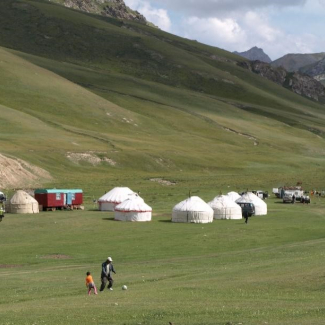
Biodiversity protects forests from the effects of climate change
Biodiversity plays a protective role in ecosystem functioning in unfavourable climate conditions, according to two studies carried out by CNRS scientists1 with German and Chinese colleagues. Results will be published on 18 March in Global Change Biology and PNAS.
Promoting biodiversity in forests could significantly mitigate the effects of climate change on carbon and nitrogen cycling – a vital process for the proper functioning of forest ecosystems and natural soil carbon storage. This process, in which organic matter such as dead leaves and other plant parts is broken down by microorganisms and soil fauna, is hampered in the drier weather conditions brought about by climate change.
Using theoretical approaches and mathematical modelling2 , the scientists demonstrated that plant diversity in a forest or prairie mitigates extreme variations in temperature on its microclimate3 and protects ecosystem processes such as decomposition.
This result was also seen in an experimental setting. The research team observed the effects of more or less diverse mixes of dead leaves from different species, in contact with more or less diverse mixes of ‘decomposer’ organisms, on five different forest ecosystems4 , ranging from temperate to tropical. A rainfall exclusion system was installed in zones of the forest under study to create drought conditions. Scientists observed that more plant diversity, paired with a greater variety of decomposers, mitigated or even fully compensated the effects of a dry climate on material cycling in a wide variety of forest ecosystems.
For the research team, these results should be mobilised for ecosystem management, particularly in forests, where is essential to promote and maintain species diversity to better protect them from global warming and its consequences.

© Junwei Luan
- 1Working at the CEFE (Centre d’écologie fonctionnelle et évolutive) (CNRS/EPHE – PSL/IRD/Université de Montpellier).
- 2The effects of varying degrees of plant diversity on the microclimates of prairie ecosystems was studied using data from the Jena experiment (https://the-jena-experiment.de/). Funded by the German Research Foundation (DFG) and ongoing since 2002, Jean is one of the longest biodiversity experiments in the world to date. It studies the effects of biodiversity on ecosystem functioning.
- 3A set of weather conditions in a very limited geographical zone that is significantly distinct from the general environment.
- 4In China, along a latitudinal gradient spanning over 20° from North (42°25’N) to South (21°55’N)
Microclimate modulation: an overlooked mechanism influencing the impact of plant diversity on ecosystem functioning. Remy Beugnon, Nolwenn Le Guyader, Alexandru Milcu, Jonathan Lenoir, Jeremy Puissant, Xavier Morin and Stephan Hättenschwiler. Global Change Biology, 18 March 2024.
Biodiversity mitigates drought effects in the decomposer system across biomes. Junwei Luan, Siyu Li, Shirong Liu, Yi Wang, Liping Ding, Haibo Lu, Lin Chen, Junhui Zhang, Wenjun Zhou, Shijie Han, Yiping Zhang and Stephan Hättenschwiler. PNAS, le 18 Mars 2024.


